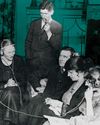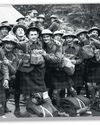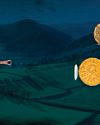
1 Do... Make a plan. And don't forget the sausage rolls
Queen Elizabeth Il's coronation was held in Westminster Abbey on 2 June 1953. Extensive preparations had been under way for months. The pressure was on: it was the first coronation in British history to be televised, and it attracted an estimated worldwide audience of 277 million.
The Duke of Norfolk, who as earl marshal was responsible for the proceedings, had drawn up no fewer than 94 diagrams, "each depicting different parts of the ceremony in which every minute was worked out, and every movement within each minute prescribed". No detail was overlooked: the Royal Mews staff even strapped a hot-water bottle under the seat of the Gold State Coach because it was an unseasonably cold, wet day.
It was a long and exhausting day for Elizabeth and her attendants, who had been up since 5am getting ready for the three-hour ceremony. Luckily, Geoffrey Fisher, the archbishop of Canterbury, was just as prepared. When the queen and her entourage retired to St Edward's Chapel towards the end of the proceedings so that she could change her gown and crown, he handed round a flask of brandy and sausage rolls. All the meticulous preparation was worth it: Elizabeth Il's coronation has been widely hailed as one of the most impressive ever staged.
2 Don't... Panic!
England's first Norman king, William the Conqueror, chose Christmas Day 1066 for his coronation. The symbolism of a new king being crowned on the anniversary of the heavenly king's birth was not lost on his Saxon subjects. But it was a tense, sombre affair. The crowds that had gathered outside the abbey were silent and subdued, and the only cheering came from the conqueror's own men.
This story is from the May 2023 edition of BBC History UK.
Start your 7-day Magzter GOLD free trial to access thousands of curated premium stories, and 9,000+ magazines and newspapers.
Already a subscriber ? Sign In
This story is from the May 2023 edition of BBC History UK.
Start your 7-day Magzter GOLD free trial to access thousands of curated premium stories, and 9,000+ magazines and newspapers.
Already a subscriber? Sign In

The Victorians' cocaine habit
In the 19th century, a magic new drug took the medical community by storm, riding a wave of scientific endeavour.

Tower of light and dark
The gold-tipped monument that towers above Bath is an architectural jewel and a visceral reminder of the evils of slavery. PAUL BLOOMFIELD visits the newly restored haven built by the wealthy outcast William Beckford

How Britain found its frequency
When radios first appeared in British homes in the early 20th century, one thing soon became clear: domestic life would never be the same again. Beaty Rubens tracks Britons' reaction to this extraordinary new technology via seven cartoons

There are only a handful of survivors left who can say what happened
I WAS INTERVIEWING AN ALMOST 98-YEAR-OLD man about his memories of the Second World War this week.

THE KING LOST KINGDOM
Battered by the Vikings, outshone by King Alfred, Mercia has long been painted as the also-ran of the Anglo-Saxon world. Yet, writes Max Adams, this mighty Midlands kingdom was at the very heart of the emergence of England

Donald Trump has retaken the US presidency, repeating his vow to 'Make America Great Again'. But he's not the first to wield such a slogan. Back in the 1980s, Ronald Reagan stood for election with the same promise.Did he deliver?
Donald Trump's recurring battle cry \"Make America Great Again!\"- taps into a powerful sense among many Americans that life was better in the old days.

"In times of political volatility, it's more vital than ever that we tell women's stories"
What impact has recent instability around the world had on the study of women’s history? Does our desire for strong female role models risk erasing complexity? And whose lives are still overlooked? Ahead of Women’s History Month, ELLIE CAWTHORNE spoke to three historians about the state of the discipline

Five shocking tales from Britain's royal palaces
Royal residences have been a hotbed of drama, violence and intrigue down the centuries, as Kate Williams reveals

Why, the villagers wondered, were they completely green?
The story of the otherworldly children of Woolpit has long been treated as folklore - but, as John Clark explains, the tale may not be as fanciful as it seems

We are witnessing the biggest gathering of people in world history
I'M SURE, LIKE ME, READERS HAVE BEEN BOTH gripped and saddened this last month by the pictures of India's Kumbh Mela, the biggest pilgrimage in the world.
